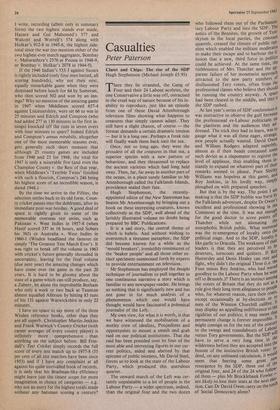Casualties
Peter Paterson
There they lie stranded, the Gang of Four and their 24 Labour acolytes, the one Conservative a little way off, ostracised in the cruel way of nature because of his in- ability to reproduce, just like an episode from one of those David Attenborough television films showing what happens to creatures that simply cannot adapt. They still have a slight chance, of course — the format demands a certain dramatic tension — but it is a long one. Perhaps a freak tide will finally wash them back into the sea.
Once, not so long ago, they were the proudest of all the creatures in that sea, a superior species with a new pattern of behaviour, and they threatened to replace the ancient varieties which had long held sway. Then, far, far away in another part of the ocean, in a place surely familiar to Mr Attenborough called the Falklands Islands, providence sealed their fate.
Hugh Stephenson, the recently- appointed editor of the New Statesman has beaten Mr Attenborough by bringing out a book on these interesting creatures, known collectively as the SDP, well ahead of the lavishly illustrated volume no doubt being prepared by BBC Publications.
It is a sad story, the central theme of which is hubris. And without wishing to overstretch a tiresome metaphor, the SDP did become known for a while as the 'mould breakers', irresistibly reminiscent of the 'beaker people' and all those other ex- tinct specimens summoned forth by experts to provide entertainment on television.
Mr Stephenson has employed the Insight technique of journalism to pull together in one continuous narrative a story which is familiar to any newspaper reader. He brings us nothing that is significantly new and has not gone in for much analysis of a phenomenon which one would have thought would have fascinated a polemical journalist of the Left.
My own view, for what it is worth, is that we have witnessed the mobilisation of a motley crew of idealists, Poujadistes and opportunists to mount a smash and grab raid on our political institutions. That the raid has been presided over by four of the most able and interesting figures in our cur- rent politics, aided and abetted by that epitome of public niceness, Mr David Steel, forces us to look at the state of the Labour Party, which produced this querulous quartet.
The onward march of the Left was cer- tainly unpalatable to a lot of people in the Labour Party — a wider spectrum, indeed, than the original four and the two dozen
who followed them out of the Parliamen- tary Labour Party and into the SDP. The antics of the Bennites, the growth of Trot- skyism in the local parties, the constant quarrels, created the climate of public opt- nion which enabled the militant moderates to make their escape and to harbour the 11° lusion that a new, third force in. politics could be achieved. At the same time, the ruthlessness of Mrs Thatcher and the ap- parent failure of her monetarist approach attracted to the new party numbers of disillusioned Tory voters, often from the professional classes who believe they should be running the country anyway. A space had been cleared in the middle, and into It the SDP rushed. At last year's series of SDP conferences it was instructive to observe the gulf between the professional ex-Labour politicians on the platform and the audiences they ad- dressed. The trick they had to learn, was to gauge what it was all these eager, strange, new people actually wanted. David Owen and William Rodgers adapted superbly, almost as if their heads contained some such device as a clapometer to register the level of applause, thus enabling them In- stantly to expand on whatever part of their remarks seemed to please. Poor Shirley Williams was hopeless at this game, and Roy Jenkins, in his lordly way, simply ploughed on with prepared speeches. But that is by the way. The point I ant making is that the SDP bubble was burst by the Falklands adventure, despite Dr Owen 's excellent and professional showing in the Commons at the time. It was not enough for the good doctor to score points off Thatcher while not alienating the xenophobic British public. What mattered was the re-emergence of loyalty onto the political stage. And to the SDP, loyalty !s like garlic to Dracula. The weakness of then. leaders is that they are perceived to he deserters, turncoats and quitters. If ROci Hattersley and Denis Healey can stay fight, why didn't the original Three (i.e. the Four minus Roy Jenkins, who had waved goodbye to the Labour Party when he wen', off to Brussels.)? There is an instinct among the voters of Britain that they do not as rule give their long term allegiance to peoPlea who, for whatever reason, turn their coats, except occasionally at by-elections or to men of the Winston Churchill calibre. It may display an appalling indifference to the
. rigidities of our politics; it may mean that
permanent change is forever impossible. I` might consign us for the rest of the centutY to the swings and roundabouts of Lab°11.1.1 versus Tory governments. But the SD? will have to serve a very long time in the wilderness before they are accepted into bosom of the instinctive British voter: In deed, on any unbiased calculation, it would .” seem that barring some great new resurgence by the SDP, three out of t..,11- original four, and 24 of the 24 who follow ed them — plus Mr Brocklebank Fowler are likely to lose their seats at the next elect, tion. Can' Dr David Owen carry on the tore" of Social Democracy alone?


































 Previous page
Previous page